FreeThinker Book Club Selections 2023-2024
https://youtu.be/WN_oH7dErrk
What’s A Freethinker Book Club?
Two members answer your FAQ’s here.
Content updates:
- This group continues to meet via Zoom.
- Canadian Unitarians now have 8 principles
All are welcomed!
 Westwood is a Unitarian Universalist Congregation that has been approved as a certified Freethinker congregation by the Unitarian Universalist Humanist Association.
Westwood is a Unitarian Universalist Congregation that has been approved as a certified Freethinker congregation by the Unitarian Universalist Humanist Association.
The Freethinker book club at Westwood is an inclusive group that welcomes people of all races, genders, sexual orientations, ages, abilities and incomes to join in respectful discussion of the topics raised in the books we read.
The book titles are democratically selected by the members of the book club.
Selection of a particular book does not imply endorsement of the book’s perspective by Freethinker members or by the Westwood Congregation.

The FreeThinker book club : Last Wednesday of the month September through June.
FreeThinker Book Club meetings in 2023-24 will be held using Zoom or where interest and safety allow, in person at Westwood. All meetings begin at 7:00 PM and last from 1 1/2 – 2 hours.
Sept. 27, 2023
7:00 PM
The World Turned Upside Down: America, China, and the Struggle for Global Leadership by Clyde Prestowitz ( 2021)
When China joined the World Trade Organization in 2001, most experts expected the WTO rules and procedures to liberalize China and make it “a responsible stakeholder in the liberal world order.” But the experts made the wrong bet. China today is liberalizing neither economically nor politically but, if anything, becoming more authoritarian and mercantilist.
In this book, notably free of partisan posturing and inflammatory rhetoric, renowned globalization and Asia expert Clyde Prestowitz describes the key challenges posed by China and the strategies America and the Free World must adopt to meet them. He argues that these must be more sophisticated and more comprehensive than a narrowly targeted trade war. Rather, he urges strategies that the United States and its allies can use unilaterally without contravening international or domestic law.
Oct. 25, 2023
The True Believer: Thoughts on the Nature of Mass Movements by Eric Hoffer (1951)
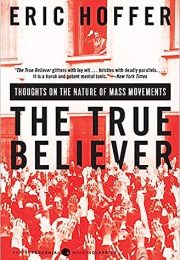
The famous bestseller with “concise insight into what drives the mind of the fanatic and the dynamics of a mass movement” (Wall St. Journal) by Presidential Medal of Freedom recipient Eric Hoffer, The True Believer is a landmark in the field of social psychology, and even more relevant today than ever before in history. Called a “brilliant and original inquiry” and “a genuine contribution to our social thought” by Arthur Schlesinger, Jr., The True Believer is mandatory reading for anyone interested in the machinations by which an individual becomes a fanatic.
Nov. 29, 2023
Einstein’s Dreams by Alan Lightman (1993)

A modern classic, Einstein’s Dreams is a fictional collage of stories dreamed by Albert Einstein in 1905, when he worked in a patent office in Switzerland. As the defiant but sensitive young genius is creating his theory of relativity, a new conception of time, he imagines many possible worlds. In one, time is circular, so that people are fated to repeat triumphs and failures over and over. In another, there is a place where time stands still, visited by lovers and parents clinging to their children. In another, time is a nightingale, sometimes trapped by a bell jar.
Now translated into thirty languages, Einstein’s Dreams has inspired playwrights, dancers, musicians, and painters all over the world. In poetic vignettes, it explores the connections between science and art, the process of creativity, and ultimately the fragility of human existence.
Jan. 31, 2024
Valley of the Birdtail: An Indian reserve, a white town and the road to reconciliation
by Andrew Sniderman and Douglas Sanderson (2022).
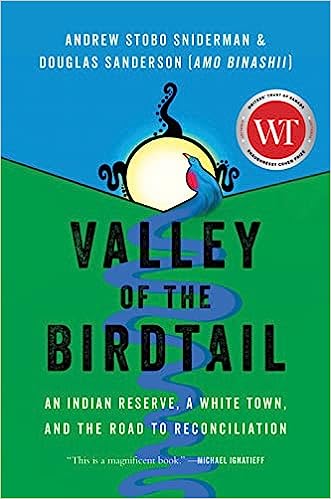
A heart-rending true story about racism and reconciliation
Divided by a beautiful valley and 150 years of racism, the town of Rossburn and the Waywayseecappo Indian reserve have been neighbours nearly as long as Canada has been a country. Their story reflects much of what has gone wrong in relations between Indigenous Peoples and non-Indigenous Canadians. It also offers, in the end, an uncommon measure of hope.
Valley of the Birdtail is about how two communities became separate and unequal—and what it means for the rest of us. In Rossburn, once settled by Ukrainian immigrants who fled poverty and persecution, family income is near the national average and more than a third of adults have graduated from university. In Waywayseecappo, the average family lives below the national poverty line and less than a third of adults have graduated from high school, with many haunted by their time in residential schools.
This book follows multiple generations of two families, one white and one Indigenous, and weaves their lives into the larger story of Canada. It is a story of villains and heroes, irony and idealism, racism and reconciliation. Valley of the Birdtail has the ambition to change the way we think about our past and show a path to a better future.
Feb. 28, 2024
Giving the Devil His Due: Reflections of a Scientific Humanist by Michael Shermer (2020)
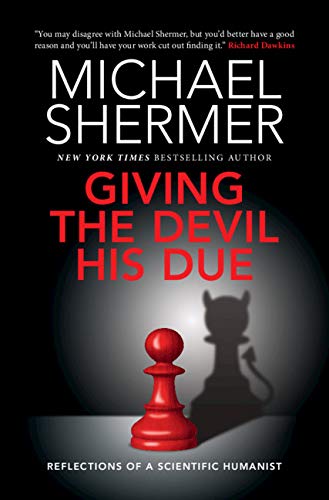
Who is the ‘Devil’? And what is he due? The Devil is anyone who disagrees with you. And what he is due is the right to speak his mind. He must have this for your own safety’s sake because his freedom is inextricably tied to your own. If he can be censored, why shouldn’t you be censored? If we put barriers up to silence ‘unpleasant’ ideas, what’s to stop the silencing of any discussion? This book is a full-throated defense of free speech and open inquiry in politics, science, and culture by the New York Times bestselling author and skeptic Michael Shermer. The new collection of essays and articles takes the Devil by the horns by tackling five key themes: free thought and free speech, politics and society, scientific humanism, religion, and the ideas of controversial intellectuals. For our own sake, we must give the Devil his due.
Mar. 27, 2024
From Strength to Strength: Finding Success, Happiness, and Deep Purpose in the Second Half of Life
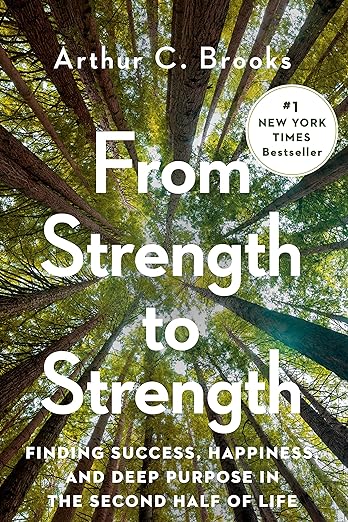
The roadmap for finding purpose, meaning, and success as we age, from bestselling author, Harvard professor, and the Atlantic’s happiness columnist Arthur Brooks.
Many of us assume that the more successful we are, the less susceptible we become to the sense of professional and social irrelevance that often accompanies aging. But the truth is, the greater our achievements and our attachment to them, the more we notice our decline, and the more painful it is when it occurs.
What can we do, starting now, to make our older years a time of happiness, purpose, and yes, success?
At the height of his career at the age of 50, Arthur Brooks embarked on a seven-year journey to discover how to transform his future from one of disappointment over waning abilities into an opportunity for progress. From Strength to Strength is the result, a practical roadmap for the rest of your life.
Drawing on social science, philosophy, biography, theology, and eastern wisdom, as well as dozens of interviews with everyday men and women, Brooks shows us that true life success is well within our reach. By refocusing on certain priorities and habits that anyone can learn, such as deep wisdom, detachment from empty rewards, connection and service to others, and spiritual progress, we can set ourselves up for increased happiness.
Read this book and you, too, can go from strength to strength.
Apr. 24, 2024
The Coddling of the American Mind: How Good Intentions and Bad Ideas Are Setting Up a Generation for Failure by Greg Lukianoff and Jonathan Haidt (2019)
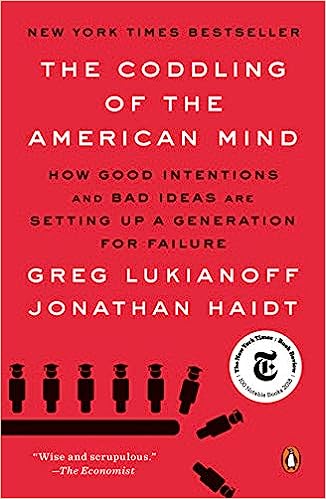
Something has been going wrong on many college campuses in the last few years. Speakers are shouted down. Students and professors say they are walking on eggshells and are afraid to speak honestly. Rates of anxiety, depression, and suicide are rising—on campus as well as nationally. How did this happen?
First Amendment expert Greg Lukianoff and social psychologist Jonathan Haidt show how the new problems on campus have their origins in three terrible ideas that have become increasingly woven into American childhood and education: What doesn’t kill you makes you weaker; always trust your feelings; and life is a battle between good people and evil people. These three Great Untruths contradict basic psychological principles about well-being and ancient wisdom from many cultures. Embracing these untruths—and the resulting culture of safetyism—interferes with young people’s social, emotional, and intellectual development. It makes it harder for them to become autonomous adults who are able to navigate the bumpy road of life.
Lukianoff and Haidt investigate the many social trends that have intersected to promote the spread of these untruths. They explore changes in childhood such as the rise of fearful parenting, the decline of unsupervised, child-directed play, and the new world of social media that has engulfed teenagers in the last decade. They examine changes on campus, including the corporatization of universities and the emergence of new ideas about identity and justice. They situate the conflicts on campus within the context of America’s rapidly rising political polarization and dysfunction.
This is a book for anyone who is confused by what is happening on college campuses today, or has children, or is concerned about the growing inability of Americans to live, work, and cooperate across party lines.
May 29, 2024
Identity: The Demand for Dignity and the Politics of Resentment by Francis Fukuyama (2018)

In 2014, Francis Fukuyama wrote that American institutions were in decay, as the state was progressively captured by powerful interest groups. Two years later, his predictions were borne out by the rise to power of a series of political outsiders whose economic nationalism and authoritarian tendencies threatened to destabilize the entire international order. These populist nationalists seek direct charismatic connection to “the people,” who are usually defined in narrow identity terms that offer an irresistible call to an in-group and exclude large parts of the population as a whole.
Demand for recognition of one’s identity is a master concept that unifies much of what is going on in world politics today. The universal recognition on which liberal democracy is based has been increasingly challenged by narrower forms of recognition based on nation, religion, sect, race, ethnicity, or gender, which have resulted in anti-immigrant populism, the upsurge of politicized Islam, the fractious “identity liberalism” of college campuses, and the emergence of white nationalism. Populist nationalism, said to be rooted in economic motivation, actually springs from the demand for recognition and therefore cannot simply be satisfied by economic means. The demand for identity cannot be transcended; we must begin to shape identity in a way that supports rather than undermines democracy.
Identity is an urgent and necessary book―a sharp warning that unless we forge a universal understanding of human dignity, we will doom ourselves to continuing conflict.
June 26, 2024
Pitch a book for next year’s FreeThinker Book Club.
Make a Pitch for next year’s Freethinkers’ reads. We hope each of us will come with a book to pitch for the coming year. If we meet the same number of times next year as this year, we need to select 6 titles.We hope we will have more than 8 pitches ( pitch in eh!)
For your pitch – try to check access – public library, cost, audio and e-reader etc. It is really fun to read reviews (for and against) your pitch on Goodreads.com
Of course it also helps to read the book, but as other nights- not necessary!